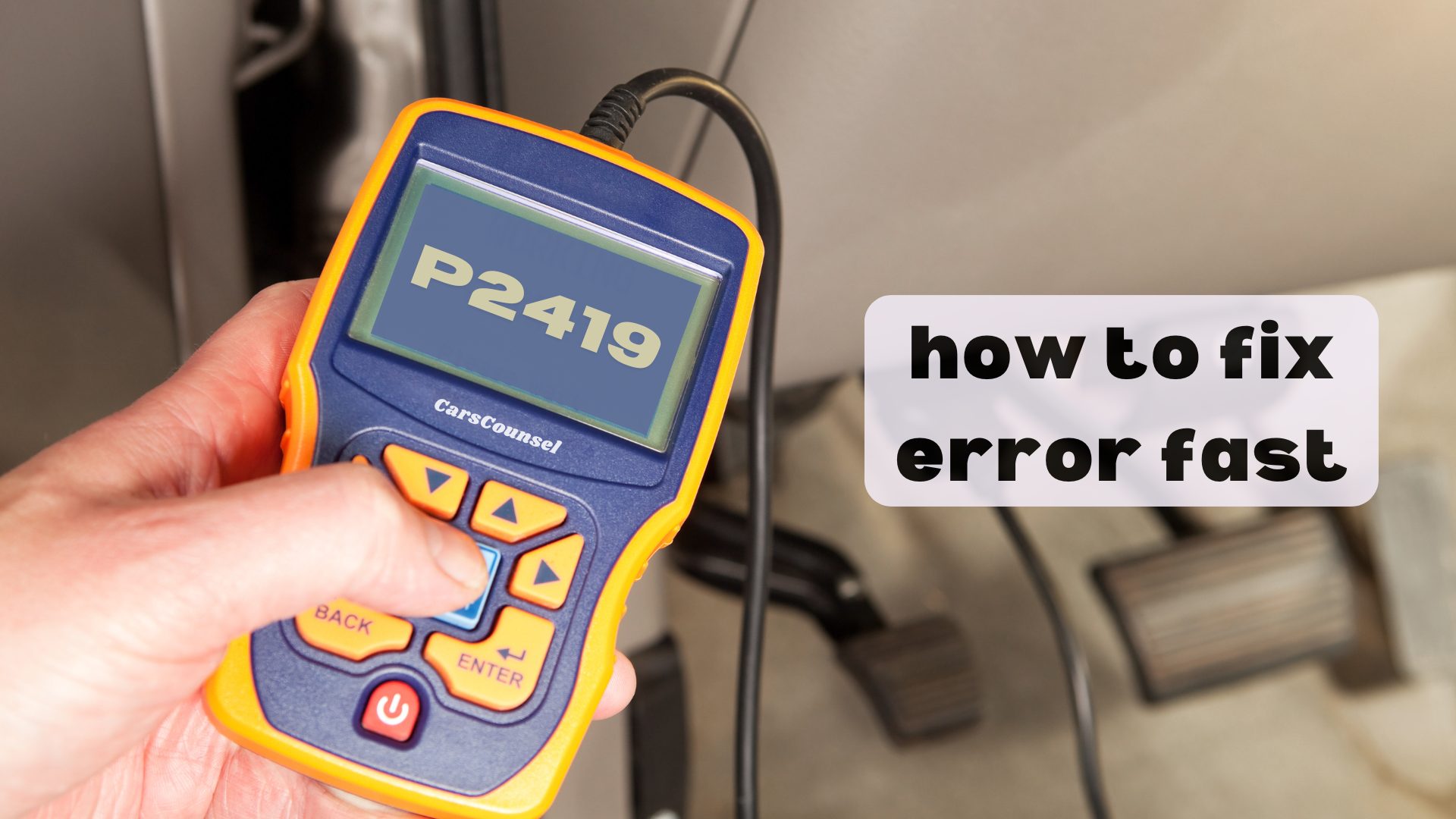When you see the P2419 code, it’s important to act quickly to avoid more problems.
First, use a scan tool to confirm the error code and gather any useful information.
Next, use a multimeter to check the fuel injector circuit for the right voltage and continuity.
Make sure to test the injectors themselves with a special tester.
Also, look for any damaged wiring or corroded connections and replace any faulty parts.
Sometimes, you might need to update the PCM (Powertrain Control Module) software.
Want to prevent this issue from happening again? Here’s what you should do next.

Quick Navigation
Key Takeaways
- Use a scan tool to read and clear the P2419 code, then perform a detailed diagnostic check.
- Inspect and clean the fuel injectors to make sure they are working properly and the fuel flow is good.
- Check the wiring and connections in the fuel injector circuit for any damage or corrosion.
- Make sure the PCM (Powertrain Control Module) has the latest software updates or reprogramming to improve fuel injector control.
Understanding the P2419 Code
Understanding the P2419 code starts with knowing it signals a problem in the fuel injector circuit‘s range or performance. This happens when the car’s Powertrain Control Module (PCM) notices something isn’t right.
The PCM plays a crucial role in keeping your fuel injectors working properly by constantly checking their performance. When it finds a problem, it triggers the P2419 code.
These problems can come from faulty injectors, damaged wiring, or external factors affecting the system. To accurately diagnose the issue, you need to use a multimeter to test the circuit, a specialized tester for the fuel injectors, and check the wiring for any faults.
Understanding these steps is key to fixing the P2419 code correctly.
Symptoms of P2419 Code
When the P2419 code pops up, you’ll notice problems like your engine not performing well, getting worse gas mileage, and your car idling roughly.
These problems happen because the fuel injector isn’t working right, which messes up how fuel is delivered to the engine.
Poor engine performance means your car won’t accelerate smoothly, making it harder to drive.
Worse gas mileage means you’ll have to fill up your tank more often.
Rough idling makes your car feel shaky when it’s just sitting there, showing that the engine isn’t running smoothly.
Fixing these issues quickly is important to avoid more damage and to keep your car running well and efficiently.
Diagnosing P2419 Code
To diagnose the P2419 code, start by using a scan tool to read the trouble codes and any related data.
Once you’ve identified the P2419 code, use a multimeter to check the fuel injector circuit to ensure it’s within the expected range.
Then, use a fuel injector tester to make sure the fuel injectors are working properly.
Inspect the wiring for any signs of damage or corrosion that could affect fuel efficiency and engine performance.
Lastly, check the PCM (Powertrain Control Module) to rule out any issues.
Common Causes of P2419
Faulty fuel injectors, which can get clogged or damaged, are one of the main reasons for the P2419 code. Keeping your fuel injectors in good shape can help prevent this issue.
Other problems include issues in the EVAP system, such as a bad purge valve or a damaged charcoal canister. The fuel tank pressure sensor and fuel pressure sensor circuit can also cause this code if they don’t send accurate information to the ECM.
Additionally, problems with the fuel injector driver circuits and a faulty Powertrain Control Module (PCM) are common causes. Fixing these parts quickly can help stop the P2419 code from coming back and keep your engine running well.
Affected Car Models
Some car models are more likely to get the P2419 code because of issues with their fuel injection systems.
For example, the Toyota Camry often has fuel injection problems. The Honda Civic can have performance issues due to clogged injectors.
Ford F-150 owners might face reliability problems because of damaged wiring in the fuel injection system. Similarly, the Chevy Silverado needs regular maintenance to fix injector and delivery issues.
While these models are more likely to have the P2419 code, any car with a fuel injection system can have this problem.
Knowing your car’s specific issues can help you find and fix problems early, keeping your car running smoothly.
Fixing Fuel Injectors
Fixing fuel injectors means cleaning or replacing parts that are clogged or damaged to keep your engine running well.
Start by disconnecting the fuel injectors and checking them for any blockages or damage. Use a fuel injector cleaner to get rid of any buildup and restore proper flow. If cleaning doesn’t solve the problem, you’ll need to replace the bad injectors.
It’s important to regularly maintain your fuel injectors to avoid future issues. Also, always use good-quality fuel to reduce deposits and ensure your engine runs smoothly.
Bad fuel can cause injectors to clog, which can hurt your vehicle’s performance. Keeping your fuel injectors in good shape will help maintain your engine’s efficiency and prevent issues like the P2419 code from coming back.
Repairing Wiring Issues
When fixing wiring problems, carefully check the whole fuel injector circuit for any damage, rust, or loose connections. Here’s how to do it:
- Look for visible damage: Check for frayed wires, exposed parts, or burn marks.
- Test connections: Use a multimeter to make sure the wires are continuous and to find any breaks or short circuits.
- Clean connectors: Use electrical contact cleaner to get rid of any rust or dirt on the connectors.
- Secure connections: Make sure all connectors are properly plugged in and locked to keep them secure.
Reprogramming the PCM
Reprogramming the PCM means updating the software in your Powertrain Control Module so it correctly reads sensor data and manages the fuel injectors.
To do this, you’ll need some specific tools. Start by connecting a diagnostic scanner to your car’s OBD-II port. Follow the steps on the scanner to download and install the latest software updates for your PCM.
This update helps the module read and respond to sensor inputs accurately, improving how your fuel injectors work. Reprogramming the PCM can fix issues that cause the P2419 code, helping your car run smoothly again.
Always use the latest software and tools to ensure the reprogramming is effective and to avoid future problems.
Preventive Measures
Taking care of your car’s fuel system regularly can help you avoid the P2419 code and keep your engine running smoothly. Stick to a good maintenance routine and pay attention to fuel quality to lower the chances of this issue.
Here are four simple steps:
- Use good-quality fuel: Always fill up at trustworthy gas stations to avoid bad fuel.
- Get regular check-ups: During routine maintenance, have the fuel system parts, like sensors and injectors, inspected.
- Keep an eye on the EVAP system: Make sure parts like the purge valve and charcoal canister are working properly to keep vapor flowing right.
- Tighten the gas cap: After you refuel, make sure the gas cap is on tight to stop any vapor leaks.
Immediate Actions
When you see the P2419 code, take your car to a good mechanic right away for a detailed check to find out what’s wrong. Acting quickly can stop more damage. Listen to the mechanic’s advice and focus on taking care of the fuel system. Regular checks and preventive steps can help keep this problem from happening again.
| Action | Description | Importance |
|---|---|---|
| Diagnostic Check | Mechanic looks at and figures out the issue | Finds the exact cause of the P2419 code |
| Fuel Injector Cleaning | Cleaning out dirty or clogged fuel injectors | Boosts fuel efficiency and performance |
| Wiring Inspection | Checking for broken or loose connections | Ensures reliable fuel injection |
| PCM Evaluation | Checking the Powertrain Control Module | Makes sure data is being sent correctly |
Acting quickly will save you money on repairs and keep your car running well.
More OBD-II Codes
Frequently Asked Questions
Can a Weak Battery Trigger the P2419 Code?
Yes, a weak battery can cause performance issues and might trigger the P2419 code. Use diagnostic tools to check the battery’s condition and voltage to make sure the electrical system is working right. This will help rule out the battery as the problem.
How Much Does It Typically Cost to Fix the P2419 Code?
Fixing the P2419 code usually costs between $100 and $300. This includes the cost of diagnosing the problem and any necessary repairs, such as fixing fuel injectors, wiring, or even replacing the PCM. The exact price can vary depending on your vehicle model and the rates charged by your mechanic.
Can Driving With the P2419 Code Damage the Catalytic Converter?
Driving with the P2419 code is like ignoring a ticking time bomb; it can damage your catalytic converter, affecting the emissions system. Fix the problem right away to avoid expensive repairs and keep your car running well.
Is It Safe to Drive With the P2419 Code Active?
It’s not safe to drive with the P2419 code active. Get it checked out right away. Look out for signs like your engine not running well or using more fuel than usual. Ignoring these problems could cause bigger engine damage.
Can Extreme Weather Conditions Affect the P2419 Code Occurrence?
Yes, extreme weather can affect the P2419 code. You might not expect it, but weather changes can mess with wiring and sensors, causing problems with the fuel injector circuit. Regular checks can help prevent these issues.
Conclusion
Imagine your car running smoothly, with everything working perfectly, thanks to your quick and precise actions.
By diagnosing the P2419 code with a scan tool and multimeter, checking the fuel injectors, and fixing any wiring problems, you’ve tackled the issue directly.
Reprogramming the PCM and sticking to regular maintenance with good quality fuel ensures your car stays reliable.
Stay attentive, and your car will reward you with top performance every time you drive.

